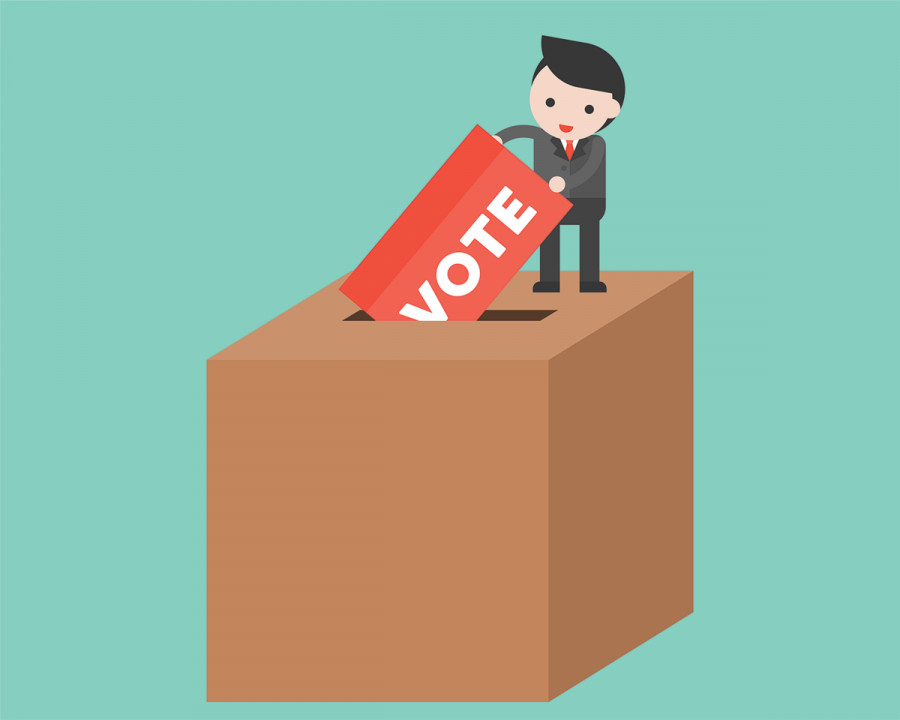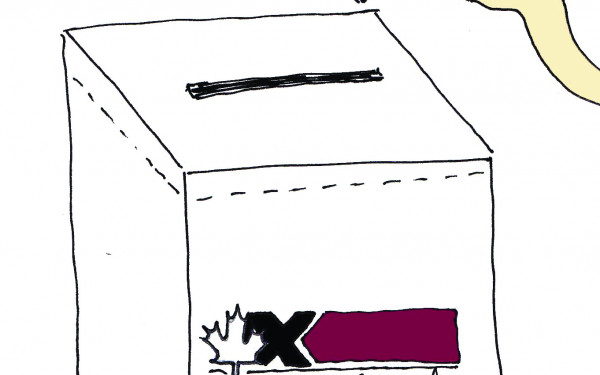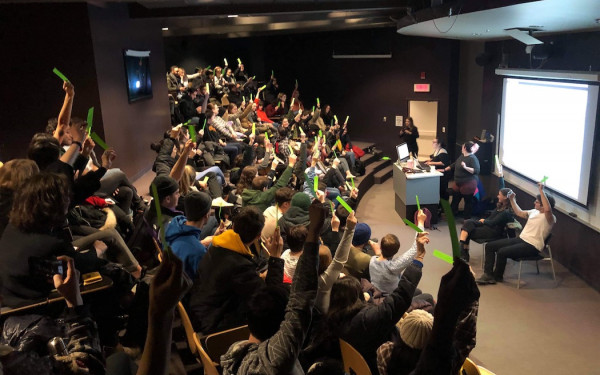A Canadian Election Survival Guide
Still Confused About How, When, Where, and Who to Vote for? We’ve Got You Covered
The federal elections are just around the corner and so is all the stress that comes every four years.
Not only do you have to choose the right candidate for you, but how do you even cast a ballot anyway? There are lots of simple steps needed to make sure you’ll get to exercise your democratic right.
Why Am I voting?
That is always one of the first questions to leave the mouth of those skeptical of the voting process. “One vote won’t change anything.” “What’s the point when all the candidates suck?” These and hundreds of other similar statements are not uncommon among young voters.
For some Concordia students like Building Engineering major Louis Rivest, the process of finding which candidate to choose to run Canada for the next four years is the toughest.
“I’d say the lead up to the vote is much harder than anything else. It’s finding out who you want to vote for that’s tough and then doing it isn’t so bad,” said Rivest.
For all those intimidated by the time it takes to make an educated decision on who to vote for, there are several resources available to understand which candidate you prefer from 15 political parties registered for the election cycle.
The quickest among them are the online quizzes which ask for your opinion on a variety of topics and then match you to a candidate, like a sort of political dating app.
The CBC has an extensive one that not only places you on a political chart, but shows you to what percentage you agree with the six national parties vying for your vote.
Immigration, climate, health, and religious freedoms are all hot topics being debated this cycle.
Take time to decide which is most important to you and see what the candidates have to say.
Rivest also shares that it can be hard to care about politics at times stating “ It’s hard to care when everything is going well, and it’s hard to want to get involved when you actually have to put effort, and put in your own research, and spend time that could be used either studying, or partying, or whatever you want. It takes time to be informed, and it takes time to make a smart, educated decision so it’s easier just not to make one.”
The Registration Process
Elections Canada has made strides to ensure that registering to vote ahead of time became significantly easier.
The Voter Registration section at elections. ca outlines the different ways to make sure you get no nasty surprises when you show up to your polling location.
You can also mail in your registration to Elections Canada, or go through their section on your yearly tax return.
Three weeks before the election, you’ll receive a new voter information card with all the details and reminders to have the appropriate paperwork before you leave for the polls.
If you didn’t register ahead of time, do not worry. Voter registration is available at your polling station the day you go to vote.
It will take longer to get into the booth, but it’s a reliable safety net if you don’t have an early registration card.
Your polling station will also be available on the same website where you can find out exactly when you can come to both advanced polling as well as on Election Day.
If taking these steps are still too intimidating, Rivest has one last piece of advice.
“[Finding out how to register] is a very small sacrifice to make just to be able to vote. I think it’s worth it personally. It depends on how invested you are in politics and what you want, but if you have the slightest interest or if you care in the slightest I think it’s easy enough that it’s worth it.”
What If I Don’t Live Anywhere Near My Riding?
Given that Concordia had just under 4,000 Canadian students who were not born in Quebec last year, a lot of them intend to vote for the candidates in their riding back home.
Not everyone has the resources or the time to go all the way back to their hometown to cast a vote in person, which is why Elections Canada lets you vote by mail.
The deadline to apply is Oct. 15 at 6 p.m.
You can do so either online at the Elections Canada website or in person at any of their offices across the country.
Once you’re registered, you will receive a special voting kit with all the information needed including how to properly fill your ballot out and where to send it.
You have to submit your ballot before Election Day since it must arrive in Ottawa by Oct. 21 at 6p.m.
“Algorithms and platforms prioritize high-engagement posts, so disinformation posts are trying to elicit a strong emotional reaction from you,”
— Caro Loutfi
How to Find Help
But, going out there in the world of election paperwork and endless bureaucracy can be daunting, to say the least.
Without any experience or people to guide new voters, a lot of mistakes or oversights could take place.
Apathy is Boring is one of the hundreds of Canadian non-partisan organizations that are part of a national effort to improve turnout amongst voters aged 18 to 34.
“We’re running our largest ever nonpartisan get out the vote campaign for this upcoming Federal Election,” said Executive Director Caro Loutfi.
“We’ve also co-launched the Canadian Vote Coalition, which is a group of over 500 organizations and young leaders working to mobilize their communities ahead of the election.”
While this may not be the American election, widespread voter misinformation is still very common through social media.
Loutfi and the rest of her team have set up multiple ways to counteract that, such as reverse Google searches, and the manipulation of sites like Facebook and Youtube in order to see less purposely misleading information.
Make Sure Nobody’s Lying to You
One of the more dangerous misinformation campaigns isn’t even one trying to get you to vote for a specific candidate—it’s trying to stop you from voting altogether. There are posts on social media trying to trick voters into not having the right paperwork.
“Algorithms and platforms prioritize high-engagement posts, so disinformation posts are trying to elicit a strong emotional reaction from you,” said Loutfi.
“[Misinformation] creates echo chambers that reinforce existing values and perspectives, increasing polarization online, and can spread disinformation.”
According to Elections Canada, there are three ways of verifying who you are once you get to your polling station.
Your first option is showing either your driver’s license or any government-issued card that has your photograph, your name, and your address.
Another option is two pieces of identification that both have your name from a comprehensive list that can be found on their website.
Documents like your voter identification card, a bank statement, or a student card are accepted so long as at least one of them has your address.
If those two options aren’t available, do not worry. You can declare your identity by submitting your name and address in writing along with another person who is assigned to the same polling station as you.
Get Involved
Apathy is Boring will spend the entirety of the campaigning period that runs from Sept. 11 until Election Day on Oct. 21 holding online and in-person events.
Through this, they’re hoping to increase involvement from youth voters and build on the momentum that saw an 18 per cent increase in voters aged 18 to 24 during the last election.
“The digital campaign is about providing resources and tools to help youth get informed ahead of the election,” said Loutfi.
“We cover everything from how our voting system works, to how to navigate disinformation online.”
When it comes to their work in person, Loutfi will be working with the rest of the Canadian Vote Coalition in order to go out and meet potential voters rather than waiting for them to come.
“Our ground game involves volunteered street teams, going to festivals and concerts, asking youth to vote,” said Loutfi.
“We’re also doing community events, table topics—where we send you a box of free food with a democracy menu to talk about the election with your friends—and election viewing parties, among other activities.”
When asked if there was a single piece of advice she could give every young voter, Loutfi asked that everyone vote with their conscience and encourage others to do the same.
“Ensure your voice and the issues you care about are heard this election by showing up on election day to vote. And, encourage one of your less-engaged friends to do the same.”
There are still a few weeks before the fate of Canada’s next four years is sealed and with so many issues nearing a boiling point, it’s of the utmost importance that everyone exercises their civic duty.
“Youth have been choosing informal venues to be heard, which includes protesting, social media movements, and community organizing, to name a few,” said Loutfi.
“That’s great, but we’re working to ensure that they also engage with our formal institutions on the issues they care about—which involves voting and holding your elected representatives accountable.”
Take your time to decide which candidate is best for you, register, and find out where to vote.
Use all the resources at your disposal, do not be afraid to ask for help, and we’ll see you at the polls.







